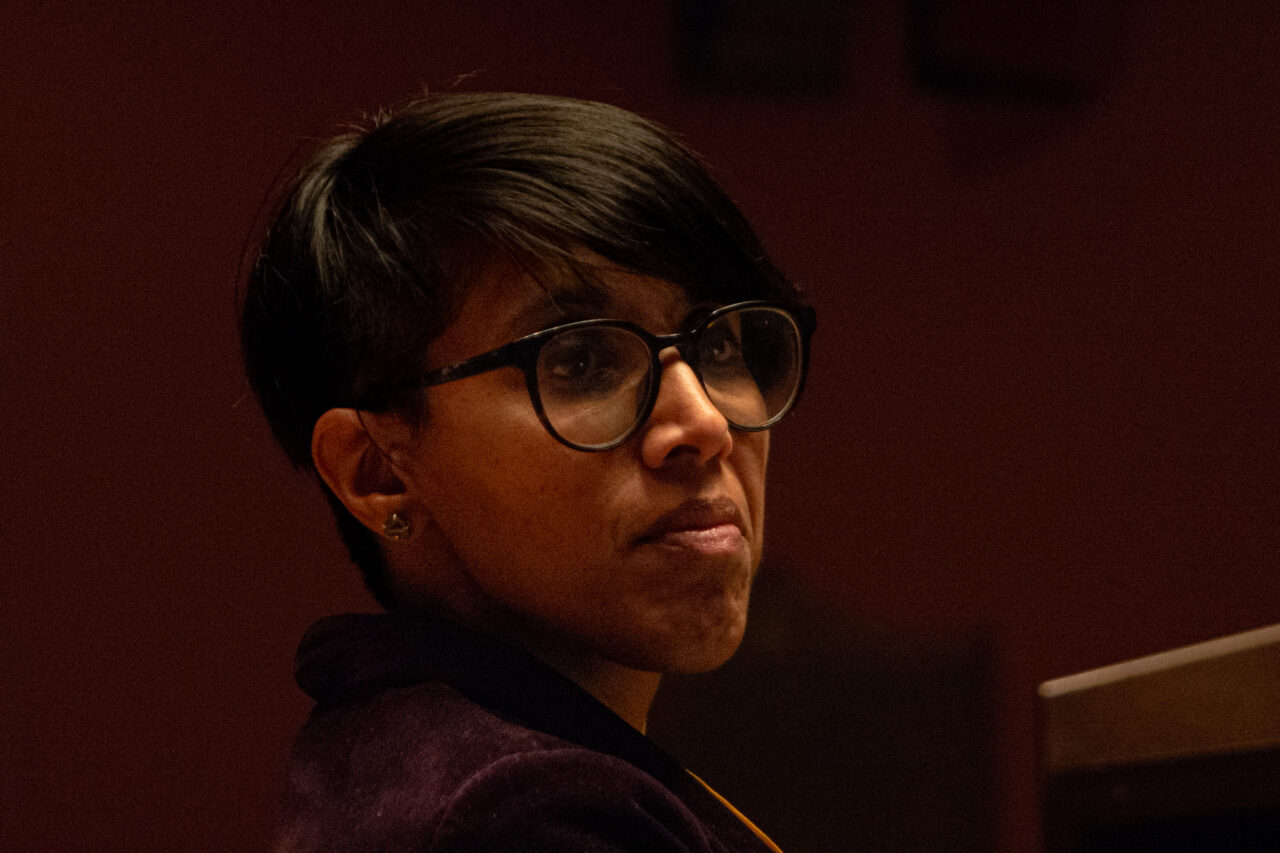Lecture Explores Impact of 1970 Black Panther Trials on Connecticut Juries

Professor of Government Sonali Chakravarti connected the 1970 Black Panther trials held in New Haven to important jury reforms taking place in Connecticut today.
Chakravarti delivered her lecture on the subject, entitled “The Black Panther Trials in New Haven and the Power of the Jury,” at the Faculty and Staff Lunch Talk held on October 5.
She outlined a brief history of the Black Panther Party in Connecticut and the facts behind two trials surrounding the 1969 murder of Alex Rackley, a 19-year-old Floridian who had been sent to help the Panther chapter in New Haven. The Black Panther Party was the target of surveillance by state and federal law enforcement, and it appeared that Rackley’s murder had been orchestrated by law enforcement, Chakravarti said. The trials were seen as overreach on the part of the state to decimate the party.
Wide-spread coverage of the murder made it difficult to find jury members, taking almost four months and the questioning of 1,500 potential jurors to complete the process. In advance of the trial about 20,000 protestors and 6,000 troops came to New Haven, creating a volatile situation. The assembly, which came to be known as the May Day protest, was peaceful, but did have an impact on how jury members viewed the Panthers.
She argued that there were several lessons to be gleaned from this historical moment.
“The first is about the power of the jury to stop politically-motivated prosecutions such as these. When so many state forces have conspired to fabricate evidence and engage in entrapment, the jury is the last mechanism to prevent the wrongful punishment of a defendant,” Chakravarti said.
The case also shows how highly publicized political trials are particularly challenging for jurors, she explained. “They can evoke an intensity that works against the power always held by the jury to find a defendant not guilty,” Chakravarti said. Another key point is about how the protracted jury selection in the case brought to the surface what it means to be an impartial juror in ways the court system has only recently begun to appreciate. “Building an understanding of racial dynamics into how it is understood to be objective,” Chakravarti said.
While the Black Panthers embraced a socialist worldview for society, the group believed in the need for a strong—and fair—jury system.
“The Fourteenth Amendment of the U.S. Constitution gives a man a right to be tried by his peer group. A peer is a person from a similar economic, social, religious, geographical, environmental, historical, and racial background. To do this the court will be forced to select a jury from the Black community from which the Black defendant came. We have been, and we are being, tried by all-White juries that have no understanding of the ‘average reasoning man’ of the Black community,” according to the Black Panther party platform.
“The centrality of a fight for a fair jury, made up of Black people who were peers of Black defendants, held obvious strategic value given how much the Panthers were the target of law enforcement,” Chakravarti said.
Decades later, the state of Connecticut was still wrestling with problematic jury selection processes. The court system set up a task force to look at race-based discrimination in Connecticut juries. Jurors can no longer be dismissed for having prior contact with law enforcement or expressing distrust of police, living in a high crime neighborhood, receiving state benefits, not being a native speaker, or being the victim of a crime.
“Some of these are shocking as indications of the type of flimsy reasoning that had been used to dismiss Black jurors in the past. These changes feel past due,” Chakravarti said.
Chakravarti believes that the issues at the center of the trial— systemic discrimination against Black people and police violence—are still relevant. “There is another lesson worth taking from their legacy: the selection of community members for a jury is always a political process and it has direct consequences for those most vulnerable in a community. While the court system in the United States has often acted against the interests and liberties of those it is supposed to protect, the mechanism of the jury continues to be a space that is difficult for those in power to capture. We must work to get the juries we deserve,” she said.

